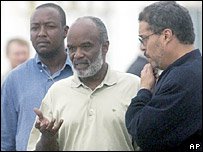
Revolutions bring with it images of blood and death. The sibling suicide of America circa 1775 the guillotined heads in France, Reds against Whites in 1917, the pot marked streets of Madrid, Bucharest and Prague. Revolutions are also known to be the forerunner to civil war.
A revolution took place last week and the world did not take notice. The island nation of Haiti, so often seen as a troubled place politically and economically voted in the first round of presidential and parliamentary elections. The first part of the revolution erupted peacefully. Haitians turned out in record numbers. Some 63% of the 3.5 million registered voters cast ballots, far more than in any other election held since the Duvalier clan was ousted from power in 1986.
The second part of the Revolution was important for what did not happen. After initial confusion around some polling stations, there was little violence on the day of voting. The voters showed a clear preference for Rene Preval, the man who was president from 1996 to 2000 and heads the L'Espwa (The Hope) movement. Unfortunately, Mr Preval has failed by a small margin to win the presidential contest outright. Supporters of Mr Preval have taken to the streets, protesting that he was robbed of an outright victory. They say the "international community" - principally the United States and France - does not want to see him back in power because in the past he has been a loyal supporter of President Jean-Bertrand Aristide. If this is true, the United States should look at Mr. Preval's record.
President Preval's four years in office were a period of relative calm, with some improvements in the Haitian economy, a more or less functioning parliament and efforts to revive local government. More importantly, and most unusual for a politician, Mr Preval kept out of the political violence of 2003-2004, and in the run-up to these elections has stressed that he is now his own man.
By voting in such massive numbers, the Haitian people have shown that they support the political process supervised by the United Nations. The 8,000-strong UN force should continue to maintain the peace over the coming weeks as the second round of voting takes place and the United States should accept the apparent winner--Mr. Preval. In the often dicey Anglo-Haitian relationship, Mr. Preval is the only former Haitian president with a positive record.

No comments:
Post a Comment